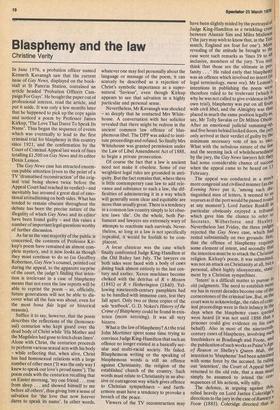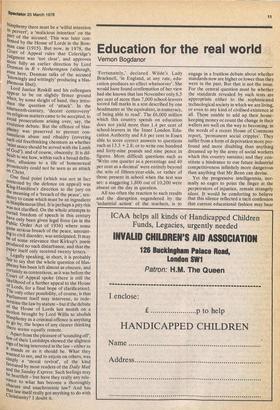Blasphemy and the law
Christine Verity
In June 1976, a probation officer named Kenneth Kavanagh saw that the current issue of Gay News, displayed on the bookstall at St Pancras Station, contained an article headed 'Probation Officers Campaign For Gays'. He bought the paper out of professional interest, read the article, and put it aside. It was only a few months later that he happened to pick up the copy again and noticed a poem by Professor James Kirkup, 'The Love That Dares To Speak Its Name'. Thus began the sequence of events which was eventually to lead to the first criminal trial for blasphemy in this country since 1921, and the confirmation by the Court of Criminal Appeal last week of fines totalling £1,500 on Gay News and its editor Denis Lemon.
The Gay News case has attracted enormous public attention (even to the point of a TV 'dramatised reconstruction' of the original trial being shown twice before the Appeal Court had reached its verdict) —and inevitably has aroused a great deal of emotional attitudinising on both sides. What has tended to remain obscure throughout the debate has been the precise nature of the illegality of which Gay News and its editor have been found guilty — and this raises a number of important legal questions worthy of further discussion.
As far as the vast majority of the public is concerned, the contents of Professor Kirkup's poem have remained an almost complete mystery, and it now looks as though they must continue to do so (as Geoffrey Robertson, Gay New's counsel, pointed out during the appeal, to the apparent surprise of the court, the judge's finding that intention is irrelevant in a case of blasphemy means that not even the law reports will be able to reprint the poem — so, officially, future generations will not be able to discover what all the fuss was about, even for the most bona fide legal or historical reasons).
Suffice it to say, however, that the poem describes the reflections of the (homosexual) centurion who kept guard over the dead body of Christ while 'His Mother and the Magdalen had gone to fetch clean linen'. Alone with Christ, the centurion proceeds to perform various sexual acts with his body — while reflecting that, when alive, Christ has had homosexual relations with a large number of other men ('It was the only way I knew to speak our love's proud name'). The poem ends with the centurion recalling that on Easter morning, 'my one friend. . . rose from sleep . . . and showed himself to me before all others', thus giving him a sense of salvation for 'the love that now forever dares to speak its name'. In other words, whatever one may feel personally about the language or message of the poem, it can scarcely be described as a rejection of Christ's symbolic importance as a supernatural `Saviour', even though Kirkup appears to see that salvation in a highly particular and personal sense.
Nevertheless, Mr Kavanagh was shocked — so deeply that he contacted Mrs White house. A conversation with her solicitor revealed that there might be redress in the ancient common law offence of blas phemous libel. The DPP was asked to institute proceedings and refused. So finally Mrs Whitehouse was granted permission under the Law of Libel Amendment Act of 1888, to begin a private prosecution.
Of course the fact that a law is ancient need not make it obsolete. Some of our weightiest legal rules are grounded in antiquity. But the fact remains that, where there is little contemporary case law to add relevance and substance to such a law, the difficulties of adminstering it in a way which will generally seem clear and equitable are more than usually great. There is a tendency in a common law country simply to let obsolete laws 'die'. On the whole, both Parliament and lawyers are extremely wary of attempts to reactivate such survivals. Nevertheless, so long as a law is not specifically repealed, it would be foolish to be complacent.
A locus classicus was the case which finally confronted Judge King-Hamilton at the Old Bailey last July. The lawyers on both sides were faced with a body of cases dating back almost entirely to the last century and earlier. Xerox machines become choked with the detritus of R v Maxon (1841) or R v Hetherington (1840). Yellowing nineteenth-century pamphlets had to be handled with immense care, lest they fall apart. Only two or three copies of the sole 'textbook', G. D. Nokes's History of the Crime of Blasphemy could be found in existence (more xeroxing). It was all very bizarre.
What is the law of blasphemy? At the trial John Mortimer spent some time trying to convince Judge King-Hamilton that such an offence no longer existed in a basically secular and multi-racial society. He failed. Blasphemous writing or the speaking of blasphemous words is still an offence against Christianity, the religion of the established church of the country. Such words must relate to Christianity in an abusive or outrageous way which gives offence to Christian sympathisers — and furthermore must have a tendency to provoke a breach of the peace.
Viewers of the TV reconstruction may
have been slightly misled by the portrayal Of Judge King-Hamilton as a twinkling cross between Alastair Sim and Miles Mallesoll ('the jury may wish to know that, in the Test match, England are four for one'). More revealing of the attitude he brought to the case were such remarks as 'lines 39 to 48 inclusive, members of the jury. You maY think that those are the ultimate in Pro' fanity . . . ' He ruled early that blaspheMY was an offence which involved no intent (,11 legal terminology, mens rea). Mr Lemon 5 intentions in publishing the poem were therefore ruled to be irrelevant (which is why he was not called to give evidence in his own trial), blasphemy was put on all fouls with civil libel, and the Almighty was thus placed in much the same position legally as, say, Mr Telly Savalas or Dr Milton Obote. After an emotional judicial summing-tiP, and five hours behind locked doors, the jot/ only arrived at their verdict of guilty by the minimum necessary vote of ten to two. What with the nebulous nature of the laW and the seeming lack of wholeheartedness by the jury, the Gay News lawyers felt theY had some considerable chance of success when the appeal came to be heard on 13 February. The appeal was conducted in a much more congenial and civilised manner (as the Evening News put it, 'among such distinguished men of letters, it seemed to us voyeurs as if the port would be passed round at any moment'). Lord Justice Roskill particular obviously enjoyed a tribunal which gave him the chance to refer t° Socrates, Wilberforce and HuxleY. Nevertheless last Friday, the three judge; rejected the Gay News case, which hau rested substantially on two grounds: firSt' that the offence of blasphemy requires some element of intent, and secondly that the intention must be to attack the Christian religion. Kirkup's poem, it was submitted. was not an attack on Christianity at all, but a personal, albeit highly idiosyncratic, statement by a Christian sympathiser. 'Intent' is a difficult matter to pursue in old judgments. The need to establish mos rea has in recent decades become one of the cornerstones of the criminal law. But, as the court was to acknowledge, the rules of corn' inal proceedings were in their infancy in the days when the blasphemy cases quoted were heard (it was not until 1898 that a prisoner could give evidence on his ow° behalf). Also in most of the nineteenth' century cases of blasphemy, involving such freethinkers as Bradlaugh and Foote, and the publication of such works as Paine'sAge of Reason or Shelley's Queen Mab, the, intention to `blaspheme' had been admit" with some force by the accused. In ruling out 'intention', the Court of Appeal have returned to the old rule, that a man Must simply be assumed to intend the C0
sequences of his actions, willy nilly. .
The defence, in arguing against thl!, relied heavily on Lord Justice Coleridge 5 directions to the jury in the case of RamseY.v Foote (1883). Coleridge directed that I° blasphemy there must be a `wilful intention to pervert', a 'malicious intention' on the Part of the accused. This was later confirmed by the House of Lords in the Bowman case (1915). But now, in 1978, the Court of Appeal rules that Coleridge's Judgment was 'not clear', and approves ttiore fully an earlier direction by Lord Denman in R v Hetherington (although, even here, Denman talks of the accused knowingly and wittingly' producing a blasPhemous libel). Lord Justice Roskill and his colleagues appear to be on slightly firmer ground !hen, by some sleight of hand, they introduce the question of 'attack'. In the nineteenth-century, 'decent controversy' O n religious matters came to be accepted, to avoid prosecutions arising over, say, the evolution debate. But the offence of biasPliemy was preserved to prevent contumelious abuse and ribaldry (covering s‘uCh old freethinking chestnuts as whether malt sauce should be served with the Lamb God'), and of course, obscenity. It is difficult to see how, within such a broad definition, allusions to a life of homosexual Promiscuity could not be seen as an attack O n Christ.
One final point (which was not in fact contested by the defence on appeal) was l(Ling-Hamilton's direction to the jury on tue meaning of a 'breach of the peace', tendency to cause which must be an ingredient in blasphemous libel. It is perhaps a pity this was not clarified. On the whole attempts to curtail freedom of speech in this century have only been given legal force (as in the Public Order Act of 1936) where some 9tlite serious breach of the peace, amount ig to civil disorder, was anticipated. It may Ibre of some relevance that Kirkup's poem Produced no such disturbance, and that the Paper itself only received twenty letters.
Legally speaking, in short, it is probably fair to say that the whole question of blasPhemy has been left almost as obscure, and certainly as contentious, as it was before the
CiAltt of Appeal spoke (there is still the likelihood of a further appeal to the House
uf Lords, for a final hope of clarification).
The only other possibility, of course, is that Parliament itself may intervene, to rede termine the law by statute —but if the debate of the House of Lords last month on a 'notion brought by Lord Willis to abolish to go by, the hopes of any clearer thinking there seems equally remote. Apart from the pleasure of 'sounding off', few of their Lordships showed the slightest Sign of being interested in the law —either as it stands or as it should be. What they wanted to see, and to enjoin on others, was sultPly a 'moral revival', of the kind favoured by most readers of the Daily Mail and the Sunday Express. Such feelings may be heartfelt — but have they really any relevance to what has become a thoroughly Obscure and anachronistic law? And has that law itself really got anything to do with Christianity? I doubt it.



































 Previous page
Previous page